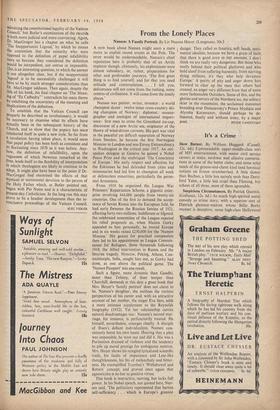Papalism Triumphant ?
The Vatican Revolution. By Geddes MacGregor. (Macmillan, 21s.)
IT was on July 18, 1870, that the final vote-about the Pope's infallibility was taken at the Vatican Council. On that day The Times correspondent (Tom Mozley) began his report from Rome as follows : `The great event so anxiously expected by Roman Catholics is now accomplished. In the midst of thunder, lightning and rain Pius IX pro- theorised himself, If I may be allowed to coin a word, and is now registered among the Dii Majores.' Arthe time and for long afterwards, it was generally believed by Protestants that Pius IX, by unconstitutional and unscrupulous methods, had succeeded in getting the dogma of papal infallibility defined in the form desired by himself and the extreme ultramontanes. It must be admitted that Roman Catholics themselves have kept this impression, alive by the large claims they are accustomed to make for papal authority, when it suits their purpose to do so. But since the publication in 1930 of Dom Cuthbert Butler's informed and dispassionate volumes on The Vatican Council it has been evident that the way the Council was conducted was, on the whole, respectable enough and that the definition of papal infallibility was in itself neither epoch- making nor revolutionary.
Dr. MacGregor's book opens with some lively descriptions of episodes and personalities con- nected with the Council, but apart from that there is little to be said in its favour. It is badly ,con- structed, diffuse and incoherent. His main theme appears to be that by the Vatican decree the Roman Church was transformed from a constitu- tional monarchy into an unlimited autocracy. But he fails to substantiate his assertions. For instance, he claims to have examined 'the historical evidence that prevents -a reasonable man from
admitting the constitutional legality of the Vatican Council,' but Butler's examination of the records is both more judicial and more convincing. Again, Dr. MacGregor has a chapter on what he calls The Inopportunist Legend,' by which he means the contention that the minority who were opposed to the definition of papal infallibility Were so because they considered the definition would be inexpedient, not untrue or impossible. This is an interesting question, to which the answer is not altogether clear, but if the inopportunist legend' is to be successfully challenged it will have to be by much stronger considerations than Dr. MacGregor adduces. Then again, despite the title of his book, his final chapter on 'The Mean- ing of "Ex Cathedra" ' contradicts his main theme by exhibiting the uncertainty of the meaning and implications of the definition.
To establish that the Vatican Council can properly be described as revolutionary, it would be necessary to examine what its effects have actually been in the subsequent history of the Church, and to show that the papacy has since conducted itself in quite a new style. So far from a revolution having taken place, it would seem that papal policy has been both as consistent and as fluctuating since 1870 as it was before. Any- how, the definition of infallibility, upon the vagueness of which Newman remarked at the time, lends itself to the flexibility of interpretation in which theologians are likely to continue to be adept. It might also have been to the point if Dr. MacGregor had examined the effects of that Mystical or sentimental devotion to the person of the Holy Father which, as Butler pointed out, began with Pio Nono and is a characteristic of present-day Catholicism. In the long run this may Prove to be a headier development than the in- conclusive proceedings of the Vatican Council.
ALEC VIDLER































 Previous page
Previous page